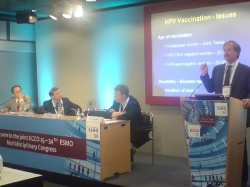Cervical cancer prevention
ECCO 15 – ESMO 34, the joint congress of the European CanCer Organisation (ECCO) and the European Society for Medical Oncology (ESMO), is Europe’s largest oncology meeting; the event drew to Berlin 15,000 participants from 120 countries this September, when more than 2,000 presentations were made.
Among the presentations on prevention, treatment and survivorship, proteomics, biomarkers, phamacogenomics and imaging, two focused on cervical cancer and the human papilloma virus (HPV) vaccination.


Jack Cuzick, Professor for Epidemiology and head of department at the Cancer Research UK Centre for Epidemiology, Mathematics and Statistics, Wolfson Institute of Preventive Medicine, London, UK, assumed that cervical cancer could be eradicated within the next 50 years if countries implement national screening programmes based on detection of the HP-virus, together with vaccination programmes against the virus. The professor is convinced that, beside the vaccination that only protects against two cancer-causing strains of the virus, vaccines would soon become available to protect against nine types.
A combination of this progress and HPV screening eventually could eliminate cervical cancer. ‘However, we need to change to screening for HPV, rather than the Pap smear test, and then it will be possible for the test to be conducted at longer intervals,’ he said.
The Pap test uses cytology to detect pre-cancerous changes to cells; it relies on subjective assessments by people examining the cells in the smear with a microscope and so is open to human error. Prof Cuzick believes such errors will increase as the proportions of smears with affected cells decline due to increasing numbers of women having been vaccinated. In contrast, the HPV test is almost completely automated, is designed to detect the virus in the smear rather than relying on visual examination, and so is much less likely to be affected by human error: ‘There is an overwhelming evidence that HPV screening is more effective than Pap smear test, which missed about a third to a half of all high grade lesions. Most of the HPV tests show sensitivity in the order of 95% for high grade lesions.’
The expert refers to the European Union and national governments to take the topic seriously and take the initiative in discussions on implementing screening and vaccination programmes, rather than leaving it to pharmaceutical companies to lead the debate.
Andrew Renehan MD, Senior Lecturer in Cancer Studies and surgery at the University of Manchester, UK, who led a modelling study that involved 30 European countries, pointed out that, in 2008, at least 124,000 new cancers may have been caused by excess body weight. The proportion of cases of new cancers attributable to a body mass index of 25/kg/m² or more were highest among women and in central European countries, such as the Czech Republic, Latvia, Slovenia and Bulgaria.
‘As more people stop smoking and fewer women take hormone replacement therapy, it is possible that obesity may become the biggest attributable cause of cancer in women within the next decade,’ he prophesied.
The highest number of obesity-related cancer was for endometrial cancer, post-menopausal breast cancer and colorectal cancer; all three accounted for 65% of all cancers related to excess BMI.
The study also identifies priorities for research into those three cancer types. ‘In the face of an unabating obesity epidemic, and apparent failure of public health policies to control weight gain, there is a need to look at alternative strategies, including pharmacological approaches,’ Dr Renehan concluded.
16.11.2009






